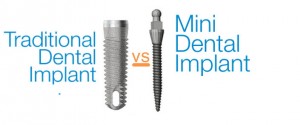There are many ads that advertise mini dental implants, and even recommend them over conventional dental implants for replacement of missing teeth. What most patients don’t realize is that mini implants are not just a smaller version of regular implants! They are designed and indicated for only temporary support of teeth and should not be considered an alternative over regular dental implants. Before investing your time, money and most important your health, here is what you need to know.
Please look at the chart below:
| Traditional Dental Implants | Mini Dental Implants |
| 4-6 mm in diameter (also available in extra wide sizes if necessary) | Size less than 2.8 mm in diameter |
| Extensive scientific and clinical research | Insufficient scientific and clinical research |
| Stand the maximum biting forces | Will NOT stand the maximum biting forces |
| High-success rate even in those who grind | Should be avoided in those who grind due to high-failure rate |
| 98% plus, long term success rate | No data available for long term success |
| Designed as permanent implants that can last a lifetime | Meant to be temporary implants with limited longevity |
| FDA approved dental implants for long term stabilization after satisfactory technical and clinical evidence that the product was safe for public use and, in fact, had beneficial attributes was provided. The FDA granted its formal consent to use dental implants for long term treatment by approving both of its components: the titanium screw and a dental crown (the dental prosthetic most often used when undergoing implant treatments). | FDA approved ONLY for temporary support of dentures |
| Best investment in long-term | Poor investment in long-term |
Mini implants, although quick and less costly to place, should only be used as temporary support for teeth. They are associated with many complications and failures including fractures, infections, and bone loss, and, therefore, not recommended for routine teeth replacement. “Only standard size implants should be used for teeth replacement to achieve long-term success and longevity,” says Dr. Kazemi.
To learn more about the disadvantages of mini dental implants, please read Dr. Kazemi’s article, Do mini implants work?
